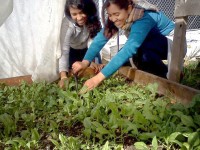Growing food during the school year in the middle of Brooklyn is no small feat, especially when your neighborhood has no access to quality supermarkets or greenspaces. Luckily, the folks at the Academy for Environmental Leadership are being the change they want to see. They have built a farm to provide a green oasis in the concrete jungle and to bring quality produce to their community. To extend the growing season, they have also built built a greenhouse with hydroponic and aquaponic systems . Although both the hydroponics system and the aquaculture system require electricity, AEL plans eventually to beself-sustaining and off the grid.
A Green Design Lab™ Project from Solar One

Learn more about this week’s Awesome Project and donate here!
“The organic farm is something these kids are taking very seriously…For a lot of these kids it really gives them a chance to experience the outdoors in a way that they haven’t [before].”
The Academy for Environmental Leadership (AEL) has been a model for urban sustainability in the heart of Brooklyn since 2006. Around 350 students, grades 9-12, attend AEL and nearly 100% are eligible for free or reduced lunch. In partnership with the two other schools on its campus, AEL built a working farm in 2011 as a place where students could both apply what they are learning in class and connect with the community. As AEL teacher Mia Lefkowitz describes, “The organic farm is something these kids are taking very seriously…For a lot of these kids it really gives them a chance to experience the outdoors in a way that they haven’t [before].”
Produce from the farm is sold at a market outside of the school to provide low cost fruits and vegetables to the community. The farm is filling a larger community need. “In terms of parks, there aren’t a lot [in Bushwick],” Mia explains. “It lacks green spaces for kids to go to and it lacks access to quality supermarkets. What we’re trying to do is bring resources to the community to help them become a stronger, more vibrant community, without people being pushed out.”
“We’re just really trying to get them comfortable with the idea that they can make a difference and that these small steps really matter.”
Last year, AEL applied to be part of Solar One’s Green Design Lab and began working with Joe Chavez, a Green Design Lab educator. He taught the students about alternative energy, and together they came up with a solution for sustainably powering the greenhouse. The students decided to attach solar panels to their farm shed, powering the greenhouse and reducing their dependence on fossil fuels. Most buildings in the United States get their energy from the electric grid, which can transmit electricity for miles from power plants using coal, oil, and natural gas. Sometimes the grid can breakdown and leave millions in the dark, like it did in 2003 for 55 million people in the US and Canada. By installing a solar panels, the Academy for Urban Leadership can power its greenhouse using renewable energy, even during a blackout.
A working model of alternative energy at their school is a wonderful teaching tool for students for alternative energy and personal empowerment. Mia explains, “We’re just really trying to get them comfortable with the idea that they can make a difference and that these small steps really matter.” The project is also engaging more students beyond the current core group of 20 dedicated student volunteers. “The cool thing about the solar power project is that it’s getting a whole new group of students involved who weren’t necessarily interested in the gardening aspect [of the farm] but they’re interested in this idea of technology and building. They’re into that.”
AEL is planning to install the solar panels as a multi-day student led workshop. Project leader Joe Chavez hopes that this will “inspire the school and other community organizations and urban farms to start using their own energy. I think it can just serve as a model and an inspiration. I just see what is happening at that school. They continue to build. Students and teachers there are dedicated to furthering their sustainability initiatives.” Chavez says that the students want to see sustainability spreading across their community. “From growing their own food, to creating their own energy, to collecting their own rainwater, I think they want to try to serve as an example of what’s possible.”
The school garden is a success with students and Mia Lefkowitz hopes to see it expand. As Mia explains, “eventually I would love our students to start creating a CSA for our school so that families in the community could have a source of fresh produce that the school is generating and they can bring home. It’s nice to see that element happening. I would love to have the security that this is a project that will last. It’s really taken off very strong and we want to keep it going throughout the years and just keep moving on to bigger things.”
Solar panels don’t come cheap. The Academy for Environmental Leadership has raised $223 so far, but is looking to raise $2,228 more. By clicking here, you can provide students an engaging lesson in green technology and construction, a community with a working model of alternative energy, and a school with a sustainable working farm (not to mention lower electricity bills). Help Mia build a project that will last.
Donate here to help the Academy for Environmental Leadership build the Solar Powered Eco-Shed!




